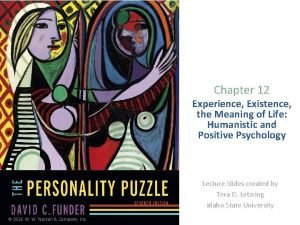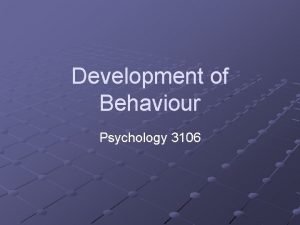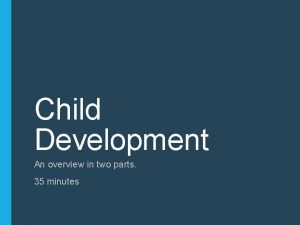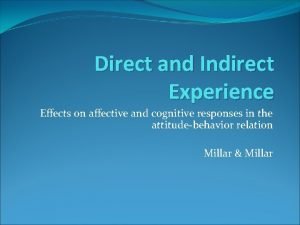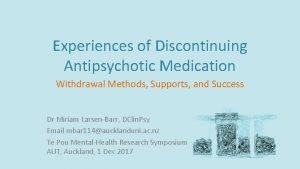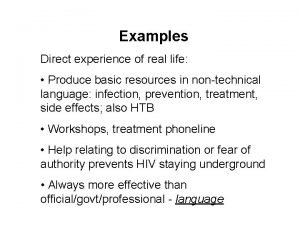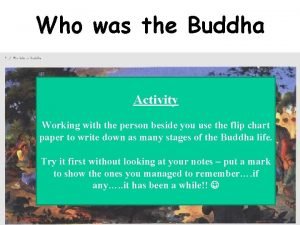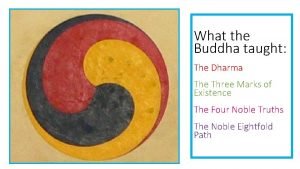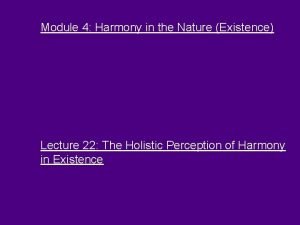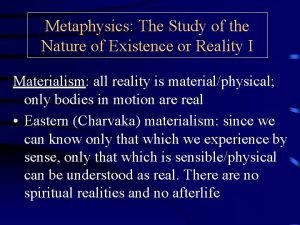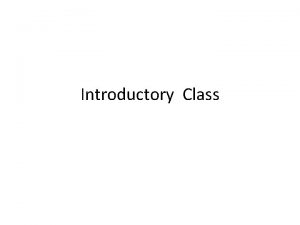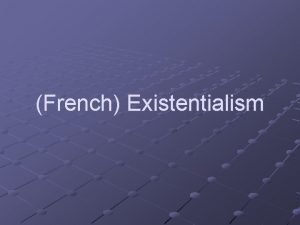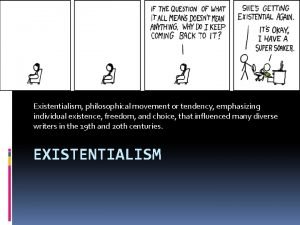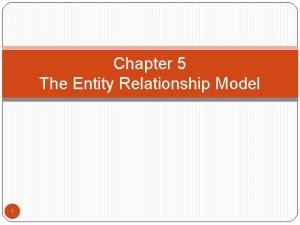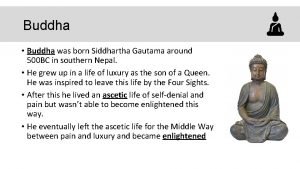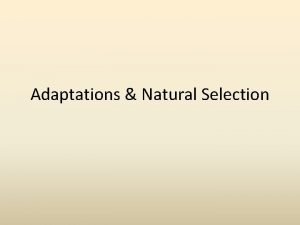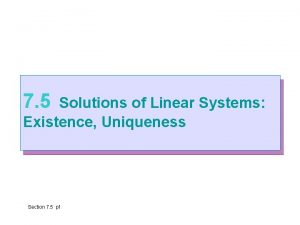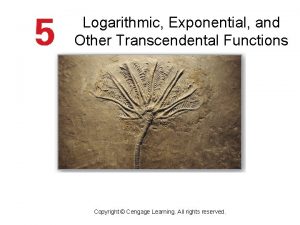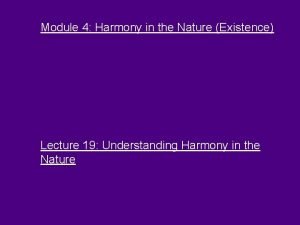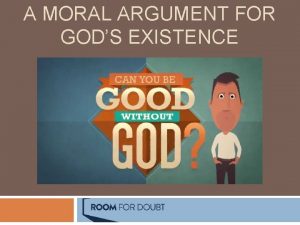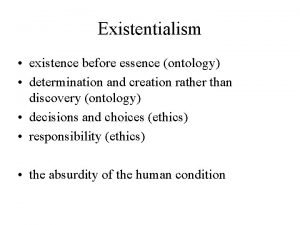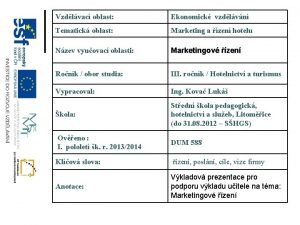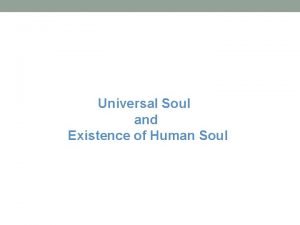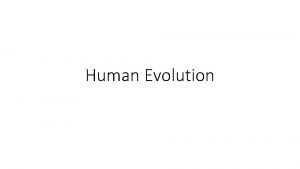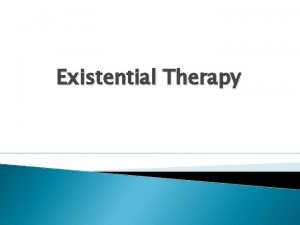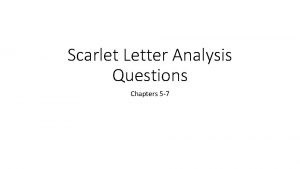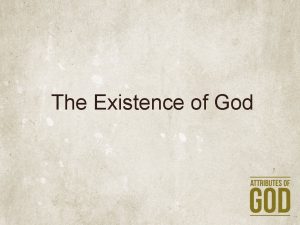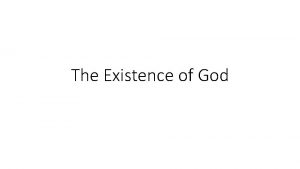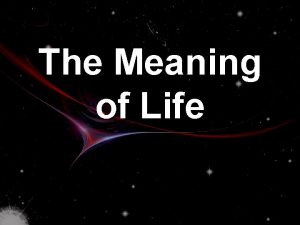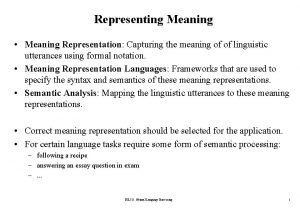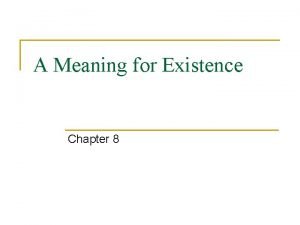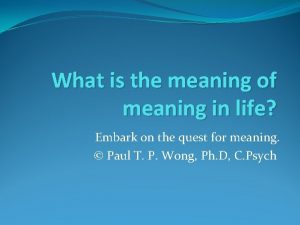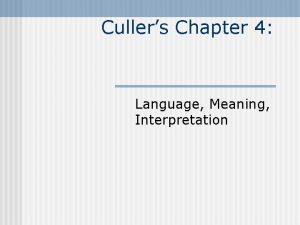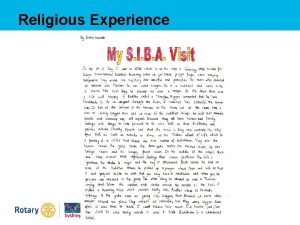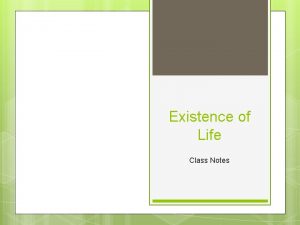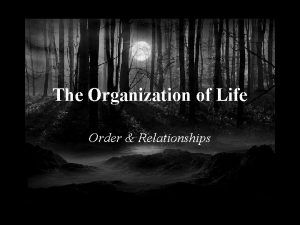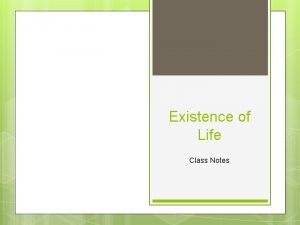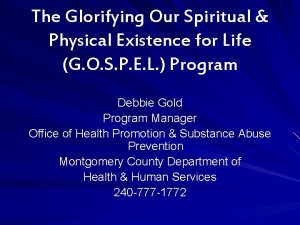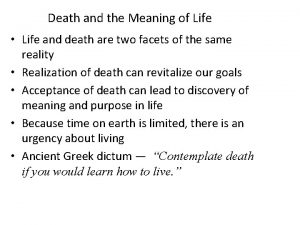Chapter 12 Experience Existence the Meaning of Life















































- Slides: 47

Chapter 12 Experience, Existence, the Meaning of Life: Humanistic and Positive Psychology Lecture Slides created by Tera D. Letzring Idaho State University © 2016 W. W. Norton & Company, Inc. © 2013 W. W. Norton & Company, Inc.

Objectives • Discuss the main issues of humanistic psychology • Discuss positive psychology • Discuss the implications of phenomenology © 2016 W. W. Norton & Company, Inc. 1

Humanistic Psychology • Goal: overcome the paradox of studying humans • Implications of self-awareness • Do people have free will? If they do, what does this mean and how is it possible? © 2016 W. W. Norton & Company, Inc. 2

Phenomenology: Awareness Is Everything • At the center of humanity • Central insight: Phenomenology is psychologically more important than the world itself – Basis of free will © 2016 W. W. Norton & Company, Inc. 3

Phenomenology: Awareness Is Everything • “We do not see things as they are. We see them as we are. ” –Talmud • “It is not things in themselves that trouble us, but our opinions of them. ” –Epictetus • “I do not react to some absolute reality, but to my perception of this reality. It is this perception which for me is reality. ” –Carl Rogers © 2016 W. W. Norton & Company, Inc. 4

Phenomenology: Awareness Is Everything • Construal – Everyone’s is different – Forms the basis of how you live your life – Free will is achieved by choosing your construal • Introspection © 2016 W. W. Norton & Company, Inc. 5

Existentialism • A reaction against rationalism, science, and the industrial revolution • Purpose: regain contact with the experience of being alive and aware • Key questions: – What is the nature of existence? – How does it feel? – And what does it mean? © 2016 W. W. Norton & Company, Inc. 6

© 2016 W. W. Norton & Company, Inc. 7

Existentialism: Three Parts of Experience • Biological experience (Umwelt) • Social experience (Mitwelt) • Psychological experience (Eigenwelt) © 2016 W. W. Norton & Company, Inc. 8

Existentialism: Thrown-ness and Angst • Thrown-ness – An important basis of your experience – Being thrown into modern society is particularly difficult • Angst – Anguish – Forlornness – Despair © 2016 W. W. Norton & Company, Inc. 9

Existentialism: Bad Faith • Our moral imperative – Requires existential courage or optimistic toughness – This can be avoided • Living in bad faith © 2016 W. W. Norton & Company, Inc. 10

Existentialism: Bad Faith • Creates three problems – Living a cowardly lie – Unhappiness – It is impossible “What is not possible is not to choose. . If I do not choose, I am still choosing. ” –Sartre © 2016 W. W. Norton & Company, Inc. 11

Existentialism: Authentic Existence • The alternative to bad faith • Will not relieve loneliness and unhappiness – Because every person is alone and doomed – Life has no meaning beyond what you give it – The essence of the human experience: understanding that you must die © 2016 W. W. Norton & Company, Inc. 12

Existentialism: Authentic Existence • Allows us to be aware of our freedom and this gives us dignity • The existential challenge • Ask: What does life want from me? – Strive to better the human condition © 2016 W. W. Norton & Company, Inc. 13

Existentialism: The Eastern Alternative • Existentialism is European, Western, and focused on the individual • Existentialism is fundamentally wrong – The self is an illusion – This illusion is harmful – True nature of reality – All people are interconnected – Immortality © 2016 W. W. Norton & Company, Inc. 14

Existentialism: The Eastern Alternative • Anicca • Enlightenment – Achieved by understanding that nothing will last forever and that the well-being of others matters as much as your own – Leads to universal compassion • Nirvana: a serene, selfless state © 2016 W. W. Norton & Company, Inc. 15

Optimistic Humanism: Rogers and Maslow • Began with existential assumptions – Phenomenology is central – People have free will • Added another crucial idea – People are basically good © 2016 W. W. Norton & Company, Inc. 16

Optimistic Humanism: Self-Actualization • People have one basic tendency and striving: to actualize, maintain, and enhance their own experience • People can be understood from the perspective of their phenomenal field • Actualization – Goal of existence is to satisfy this need © 2016 W. W. Norton & Company, Inc. 17

Optimistic Humanism: The Hierarchy of Needs • Basic assumption: The ultimate need or motive is to self-actualize • Hierarchy of needs: how human motivation is characterized – Lower needs must be met first © 2016 W. W. Norton & Company, Inc. 18

Maslow’s Hierarchy of Needs © 2016 W. W. Norton & Company, Inc. 19

Optimistic Humanism: The Hierarchy of Needs • Practical applications – Career choice – Employee motivation – Understand happiness in different cultures © 2016 W. W. Norton & Company, Inc. 20

Optimistic Humanism: The Hierarchy of Needs • Update to Maslow’s hierarchy © 2016 W. W. Norton & Company, Inc. 21

Optimistic Humanism: The Fully Functioning Person • Be clearly aware of reality and yourself • Face the world without fear, self-doubt, or neurotic defenses • Importance of unconditional positive regard • Conditions of worth – Limit your freedom to act and think © 2016 W. W. Norton & Company, Inc. 22

Optimistic Humanism: Psychotherapy • Goal: help the client become a fully functioning person • The therapist develops a genuine and caring relationship with the client and provides unconditional positive regard © 2016 W. W. Norton & Company, Inc. 23

Optimistic Humanism: Psychotherapy • Jobs of therapist – Help the client perceive own thoughts and feelings – Make the client feel appreciated • Goals – Allow insight – Remove conditions of worth © 2016 W. W. Norton & Company, Inc. 24

Optimistic Humanism: Psychotherapy • Efficacy research – Real and ideal self-perceptions became more closely aligned after therapy • Criticism of research – Both real and ideal selves change with therapy – Having closely aligned real and ideal selves is not always a good measure of psychological adjustment © 2016 W. W. Norton & Company, Inc. 25

Think About It • If a psychotherapist is treating a murderer, do you think therapist should give the client unconditional positive regard? Why or why not? © 2016 W. W. Norton & Company, Inc. 26

Personal Constructs: Kelly • Based on how one’s cognitive system assembles various construals of the world • Help to determine how new experiences are construed • Each person has a unique set © 2016 W. W. Norton & Company, Inc. 27

Personal Constructs: Kelly • Role Construct Repertory (Rep) Test – Identify three important people and then identify how two of them are similar and different from the third – Repeat with ideas, traits, and so on © 2016 W. W. Norton & Company, Inc. 28

Personal Constructs: Kelly • • Chronically accessible constructs Sources of constructs Personal construct system Sociality corollary © 2016 W. W. Norton & Company, Inc. 29

Personal Constructs: Kelly • Constructs and reality – Constructive alternativism – Implications for science • Scientific paradigms are frameworks for construing the meaning of data • Researchers choose which paradigm to use • Importance of being aware that other paradigms exist and are equally plausible © 2016 W. W. Norton & Company, Inc. 30

Personal Constructs: Kelly • Maximizers versus satisficers – “How you choose to see the world will affect everything in your life” (p. 443) • Questions the construals of reality that you are taught © 2016 W. W. Norton & Company, Inc. 31

Flow: Csikszentmihalyi • Optimal experience • Autotelic activities • Flow – Tremendous concentration, total lack of distractibility, thoughts concerning only the activity at hand – Mood that is slightly elevated – Time seems to pass very quickly • When challenge matches skill © 2016 W. W. Norton & Company, Inc. 32

Flow: Csikszentmihalyi • The secret for enhancing your quality of life • Would you spend the majority of your life in a state of flow if you could? © 2016 W. W. Norton & Company, Inc. 33

Self-Determination Theory: Deci and Ryan • Based on distinction between two ways of seeking happiness – Hedonia – Eudaimonia • Hedonia is dangerous • Extrinsic versus intrinsic goals © 2016 W. W. Norton & Company, Inc. 34

Self-Determination Theory: Deci and Ryan • Three central intrinsic goals – Autonomy – Competence – Relatedness • Research support for advantages of following intrinsic goals • Claim of universality © 2016 W. W. Norton & Company, Inc. 35

Positive Psychology • Health means more than the absence of disease • Traditional psychology overemphasizes psychopathology and malfunction and ignores the question of the meaning of life • The focus of positive psychology is positive phenomenon and the meaning of life © 2016 W. W. Norton & Company, Inc. 36

Positive Psychology • True happiness comes from overcoming important challenges – Investigates the traits, processes, and social institutions that promote a happy and meaningful life – Factors that contribute to happiness and subjective well-being © 2016 W. W. Norton & Company, Inc. 37

Positive Psychology • Optimism: advantages and disadvantages • Character strengths and virtues: courage, justice, humanity, temperance, wisdom, transcendence – Difficult to identify virtues for everyone – May be evolutionarily based – But not everyone has them all © 2016 W. W. Norton & Company, Inc. 38

Positive Psychology Tradition Courage Justice Humanity Temperance Wisdom Transcendence Confucianism E E T Taoism E E T Buddhism E E E T E Hinduism E E E Athenian philosophy E E E T Christianity E E E Judaism E E E Islam E E E © 2016 W. W. Norton & Company, Inc. 39

Positive Psychology • Not the complete rebirth of humanism – It does not say much about existential anxiety or the difficult dilemmas that arise from free will – Focuses on subjective well-being © 2016 W. W. Norton & Company, Inc. 40

The Implications of Phenomenology: The Mystery of Experience • Conscious experience cannot be explained by science and is difficult to describe in words • Problems – Assuming conscious awareness is not important and proceeding as if it did not exist – Treating conscious experience as a form of information processing done by a computer © 2016 W. W. Norton & Company, Inc. 41

The Implications of Phenomenology: The Mystery of Experience • Cognitive theories: consciousness is a higherorder cognitive process that organizes thoughts and allows flexible decision making • What does it feel like to be alive and aware? How could you tell whether a computer had this feeling? © 2016 W. W. Norton & Company, Inc. 42

The Implications of Phenomenology: Understanding Others • To understand another person, you must understand his construals • Discourages judgmental attitudes • Consequence: cultural and moral relativism • Do not judge the values and practices of other cultures from the perspective of your own © 2016 W. W. Norton & Company, Inc. 43

Clicker Question #1 The alternative to bad faith is a) living an authentic existence. b) being connected with others and happiness. c) achieving nirvana. d) experiencing thrown-ness. © 2016 W. W. Norton & Company, Inc. 44

Clicker Question #2 According to optimistic humanism, the goal of life is to a) understand other people. b) self-actualize, or maintain and enhance life. c) enhance one’s social experience, or Mitwelt. d) achieve enlightenment. © 2016 W. W. Norton & Company, Inc. 45

Clicker Question #3 Which of the following is true about flow, or autotelic experience? a)People who spend more time in flow tend to be depressed. b)During flow, time seems to pass very slowly. c)People experience a very positive state during flow. d)In order to experience flow, a person’s skills must meet the challenge of the activity. © 2016 W. W. Norton & Company, Inc. 46
 Explanation experience existence exciting
Explanation experience existence exciting Imprinting meaning psychology
Imprinting meaning psychology Early experience vs. later experience
Early experience vs. later experience Direct experience and indirect experience
Direct experience and indirect experience Different life roles
Different life roles My life experience
My life experience Best life experience granada
Best life experience granada Direct experience example
Direct experience example Skhandas
Skhandas What are the 3 marks of existence
What are the 3 marks of existence What are the three characteristics of existence
What are the three characteristics of existence Modified chen notation
Modified chen notation Holistic perception of harmony
Holistic perception of harmony The study of the nature of existence
The study of the nature of existence Disembodied existence definition
Disembodied existence definition Gst 113
Gst 113 Existence precedes essence in french
Existence precedes essence in french Existentialism movement
Existentialism movement Existence dependency constraint
Existence dependency constraint Buddhist beliefs
Buddhist beliefs A habitat supplying the necessary factors for existence
A habitat supplying the necessary factors for existence Factors of natural selection
Factors of natural selection Existence and uniqueness theorem
Existence and uniqueness theorem Lesson 3 existence and uniqueness
Lesson 3 existence and uniqueness Inverse function graph examples
Inverse function graph examples Existence
Existence Four orders of nature
Four orders of nature Moral argument for god's existence
Moral argument for god's existence Existence before essence
Existence before essence účel (smysl) existence firmy určuje
účel (smysl) existence firmy určuje Rational soul
Rational soul Australopithecus years of existence
Australopithecus years of existence Exsistere
Exsistere Existence
Existence The scarlet letter chapter 5 quotes
The scarlet letter chapter 5 quotes Hình ảnh bộ gõ cơ thể búng tay
Hình ảnh bộ gõ cơ thể búng tay Slidetodoc
Slidetodoc Bổ thể
Bổ thể Tỉ lệ cơ thể trẻ em
Tỉ lệ cơ thể trẻ em Chó sói
Chó sói Thang điểm glasgow
Thang điểm glasgow Bài hát chúa yêu trần thế alleluia
Bài hát chúa yêu trần thế alleluia Môn thể thao bắt đầu bằng chữ f
Môn thể thao bắt đầu bằng chữ f Thế nào là hệ số cao nhất
Thế nào là hệ số cao nhất Các châu lục và đại dương trên thế giới
Các châu lục và đại dương trên thế giới Công thức tiính động năng
Công thức tiính động năng Trời xanh đây là của chúng ta thể thơ
Trời xanh đây là của chúng ta thể thơ Cách giải mật thư tọa độ
Cách giải mật thư tọa độ
